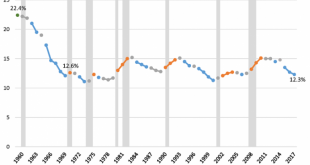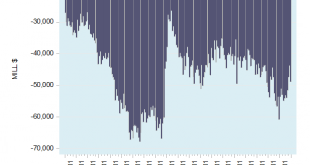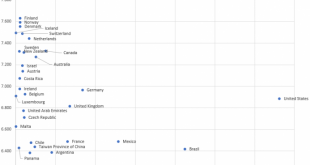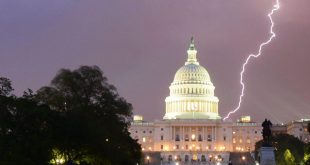One of the most common debates that has occurred in the United States for the past six decades is the discussion of the poverty rate. As the narrative goes, the US has an unusually high poverty rate compared to equivalent nations in the OECD (Organisation for Economic Co-operation and Development). Although it’s true that the measure of poverty is flawed, especially when compared cross-nationally, this piece addresses the reasons why the poverty rate in the US in...
Read More »Some Problems with Worker Productivity Stats
According to the US Labor Department, worker productivity in the non-farm sector increased at an annual rate of 1.4 percent in the fourth quarter of 2019 after declining by 0.2 percent in the previous quarter. For the year, productivity increased 1.7 percent, up from 1.3 percent in both 2017 and 2018. It was the best annual showing since the 3.4 percent increase in 2010. For most commentators, an increase in productivity is considered an indication that the US...
Read More »Three Reasons Why Decentralization and Secession Lead to More Open Economies
When we hear of political movements in favor of decentralization and secession, the word “nationalist” is often used to describe them. We have seen the word used in both Scottish and Catalonian secession movement, and in the case of Brexit. Sometimes the term is intended to be pejorative. But not always. When used pejoratively — as was the case with critics of Brexit — the implication is that the separatists seek to exit a larger political entity for the purposes of...
Read More »Rothbard: The Constitution Was a Coup d’État
[Conceived in Liberty: The New Republic, 1784–1791. By Murray N. Rothbard. Edited by Patrick Newman. Mises Institute, 2019. 332 pages.] We owe Patrick Newman a great debt for his enterprise and editorial skill in bringing to publication the fifth volume, hitherto thought lost, of Murray Rothbard’s Conceived in Liberty. The details of his rescue of the lost manuscript are indeed dramatic, but rather than recount them here, I should like to concentrate on a theme...
Read More »Government “Fixes” for the Trade Balance Are Far Worse Than Any Trade Deficit
In December 2019, the US trade account balance stood at a deficit of $48.9 billion, against a deficit of $43.7 billion in November and $60.8 billion in December 2018. Most commentators consider the trade account balance the single most important piece of information about the health of the economy. According to the widely accepted view, a surplus on the trade account is considered a positive development while a deficit is perceived negatively. What is the reason for...
Read More »Small Countries Are Better: They’re Often Richer and Safer Than Big Countries
In the wake of the Brexit vote, Scottish nationalists have renewed their calls for a new referendum on Scottish independence. But many remain unconvinced, and many claim Scotland is “too small” to be an independent country. Others claim that Scotland is too poor, since Scotland’s GDP per capita is only 90 percent that of England. But by no measure is Scotland a “poor” country. It may be poorer than England, but Scotland’s GDP per capita puts it about halfway down the...
Read More »Europe Can’t Afford a New “Green Deal”
Today’s brand of the left-leaning politician is all about substituting what sounds good for what actually works. Modern politics, whether in the US or Europe, is about taking a chainsaw to everything that produced even a modicum of success to appease the deities espousing progressive orthodoxy. There is no better example of this than fossil fuels, an energy source that has lifted us out of destitution and darkness, and given us incredible wealth that the world had...
Read More »The Economy Is Not a Factory—Nor Should We Try to Make It One
A common issue with economists and political economists from left to right is that they misunderstand the market economy as simply being a set of production processes. We see this in Lenin’s statement that the Soviet Union should be run like one big factory. We see it in market socialists from Frederic Taylor to Oskar Lange attempting to respond to (and resolve) Mises’s argument that socialist economic calculation is impossible. And we see the same thing in the...
Read More »The Fight for Liberty and the Beltway Barbarians
In the conservative and libertarian movements there have been two major forms of surrender, of abandonment of the cause. The most common and most glaringly obvious form is one we are all too familiar with: the sellout. The young libertarian or conservative arrives in Washington, at some think-tank or in Congress or as an administrative aide, ready and eager to do battle, to roll back the State in service to his cherished radical cause. And then something happens:...
Read More »Why Progressives Are Anti-Vaxxers When It Comes to the Alt Right
Bob Murphy first explains a standard progressive viewpoint when it comes to dealing with issues like virus outbreaks, underage drinking, and prostitution. Yet, when it comes to dealing with people whose views they abhor, the progressives suddenly are “zero tolerance” and ignore the mechanisms they point to for the other issues. For more information, see BobMurphyShow.com. The Bob Murphy Show is also available on iTunes, Stitcher, Spotify, and via RSS....
Read More » Swiss Economicblogs.org
Swiss Economicblogs.org








